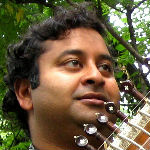
Srinivas Reddy is a scholar, translator and musician. He studied classical South Asian languages and literatures at UC Berkeley and currently teaches at Brown University and IIT Gandhinagar. Srinivas is also a concert sitarist and studied in the traditional guru-śiṣya paramparā with Pandit Partha Chatterjee, senior disciple of the late sitar maestro Pandit Nikhil Banerjee of the Maihar gharana. Srinivas’s books include Raya: Krishnadevaraya of Vijayanagara (2020), Meghadutam: The Cloud Message (2017), Malavikagnimitram: The Dancer and the King (2015), and Amuktamalyada: Giver of the Worn Garland (2010). www.srinivasreddy.org
Abstract of the lecture
In Part 1 of this presentation on Indian music, we will explore the theoretical formulation and historical evolution of the mārga-deśi concept as expressed in the saṅgīta-śāstra literature, including seminal texts such as Bharata’s Nāṭyaśāstra, Mātaṅga’s Bṛhaddeśi, Śārṅgadeva’s Saṅgītaratnākara and Rāmāmātya’s Svaramelakalānidhi. Emphasis will be placed on how theoretical ideas have evolved over time in dialogue with living musical traditions and practitioners. Consideration will also be given to the concepts of nāda and rasa as both musical realities and philosophical ideas.
In Part 2 of this presentation on Indian music, we will delve into specific musical examples from living and past masters from both the classical and folk music traditions, including artists such as Pandit Nikhil Banerjee, Prahlad Singh Tipaniya, M.S. Subbulakshmi and Ustad Nusrat Fateh Ali Khan. Emphasis will be placed on how practicing artists embody the concept of mārga-deśi and thereby complicate the classical/folk binary in both their lives and performances. We will also explore how diverse musical practices from across the country, with specific focus on the Manganiyars of Rajasthan, exhibit shared themes of guru-śiṣya paramparā, patronage and improvisation.
Readings